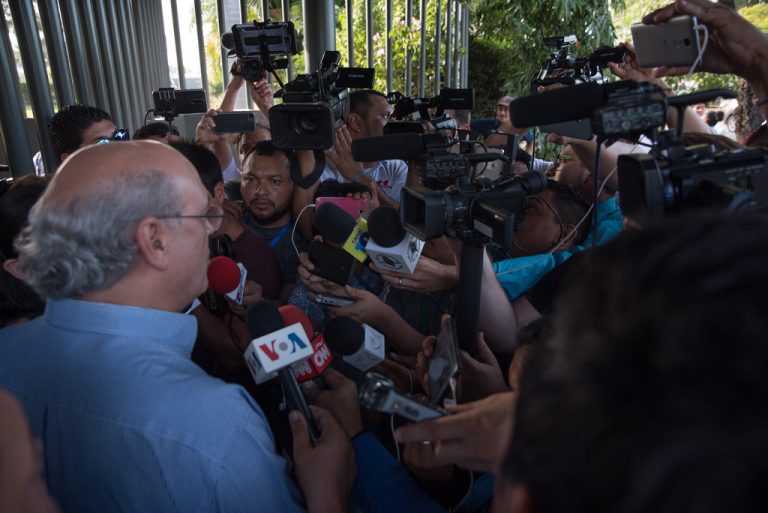21 de diciembre 2018

“NicaraguAmor” Cultural Caravan for Nicaraguans in the USA

PUBLICIDAD 1M
PUBLICIDAD 4D
PUBLICIDAD 5D
Director of Confidencial and Esta Semana states: “If the Government tries to prevent us from continuing to work, we will find a way to do it.”

Carlos F. Charmorro speaking with the media after presenting a writ of amparo on December 17th. Photo: Carlos Herrera / Confidencial
The journalist and director of “Confidencial” and the “Esta Semana” TV program, Carlos Fernando Chamorro, reacted to the assault and illegal takeover of his offices, by saying that all Nicaraguans are exposed to the dictatorship fabricating charges to censor them or turn them into political prisoners. However, he maintained that even without space for a newsroom, the media outlets he directs will continue reporting.
“The physical place is not the most important thing. We have continued working and there is the testimony, in our editions and in the television programs we have made. If the government tries to prevent us from continuing to work, we will find a way to do it,” said Chamorro, outside the Managua court, where on Monday afternoon he filed two writs of amparo on the grounds of unconstitutionality for the assault and illegal occupation of its offices, which violates at least 14 articles of the Constitution.
“We are not alone, we are accompanied by the citizens who are the sources of freedom of expression,” the journalist added.
Chamorro said that “if there are currently 600 political prisoners, in the regime’s plans there could be many more.” He noted that “nobody is safe here. No one is protected by the law because there is no rule of law, we are all exposed to having our lives and physical integrity not be respected.”
Chamorro said that he and his team will continue denouncing the corruption and the crimes, and called on the Nicaraguan people not to self-censor, even though, as human beings, there is fear of being crushed by a regime that rules by force and terror.
“I come shielded by the morals of my parents, Pedro Joaquin Chamorro and Violeta Barrios de Chamorro. That is what protects me to be here. Those values, that legacy to which all Nicaraguans should be consequent with. My father answered what all Nicaraguans should answer: everyone is the owner of their own fear. All of us as citizens have to manage fear and overcome it and show that ideas cannot be killed and neither can ideas be killed by killing journalists,” he expressed.
Chamorro also declared that “the newsroom of Confidencial is in the soul, in the minds of journalists.”
The writs filed by Invermedia and Promedia, the production company of the media outlets, were presented on behalf of Chamorro by the criminal lawyer Lester Mendoza, who explained that these were properly filed and should have reached the desks of magistrates Gerardo Rodriguez and Nestor Castillo, presidents of the civils chambers one and two, respectively.
After reviewing the documents, Rodriguez and Castillo, must request that the Chief of the National Police, Francisco Diaz, present a report on the actions of the police institution in the assault and occupation of the companies.
Within ten days, with or without the police report, Rodriguez and Castillo, will have to forward the appeals to the Constitutional Chamber of the Supreme Court of Justice (CSJ), chaired by Magistrate Francisco Rosales and made up by Rafael Solis, Manuel Martinez, Armando Juarez, Carlos Aguerri and Ileana Perez.
“It is assumed that the magistrates of the Constitutional Chamber of the CSJ have a maximum term of thirty days to rule, but because of the circumstances that we are in periods of Christmas festivities and end of the year, it is probable that it may take the entire month of January,” said the criminal lawyer.
Chamorro assured that if the magistrates do not act in accordance with the law, “they would become accomplices of an illegal act that can only be explained by the political decision of the orders issued by the supreme head of the State.”
Mendoza said that in virtue of what is established in the Nicaraguan Constitution, from the moment the officers did not present a court order to enter the companies, they acted outside the law, which establishs that a property can only be entered in virtue of some flagrant offense or in persecution of a criminal, and if this type of situations does not happen, the police need a search warrant.
“The Police did not present anything in this case. We are not facing a flagrant offense and are unaware if there is any complaint or accusation against the representatives of these companies to justify the act committed,” Mendoza insisted.
PUBLICIDAD 3M
Periodista. Investiga temas de medio ambiente, corrupción y derechos humanos. Premio a la Excelencia Periodística Pedro Joaquín Chamorro, Premio de Innovación Periodística Connectas, y finalista del premio IPYS en el 2018.
PUBLICIDAD 3D